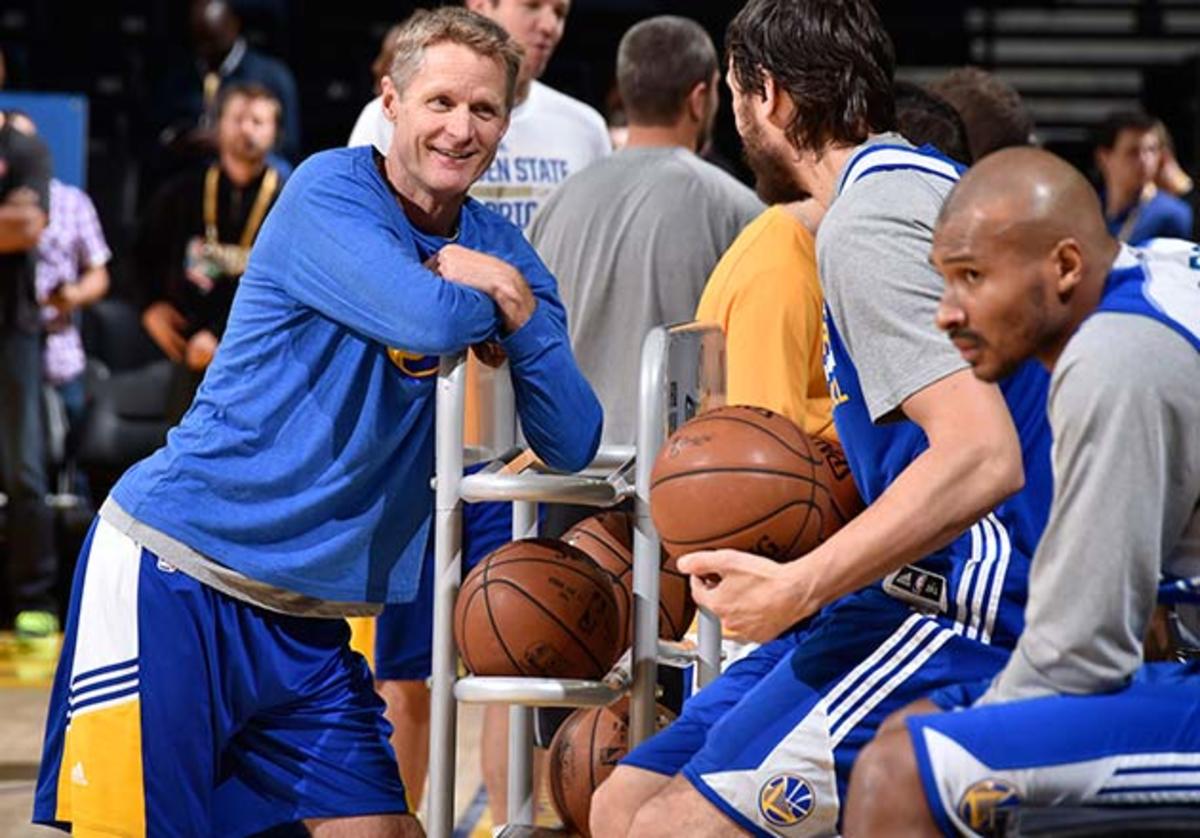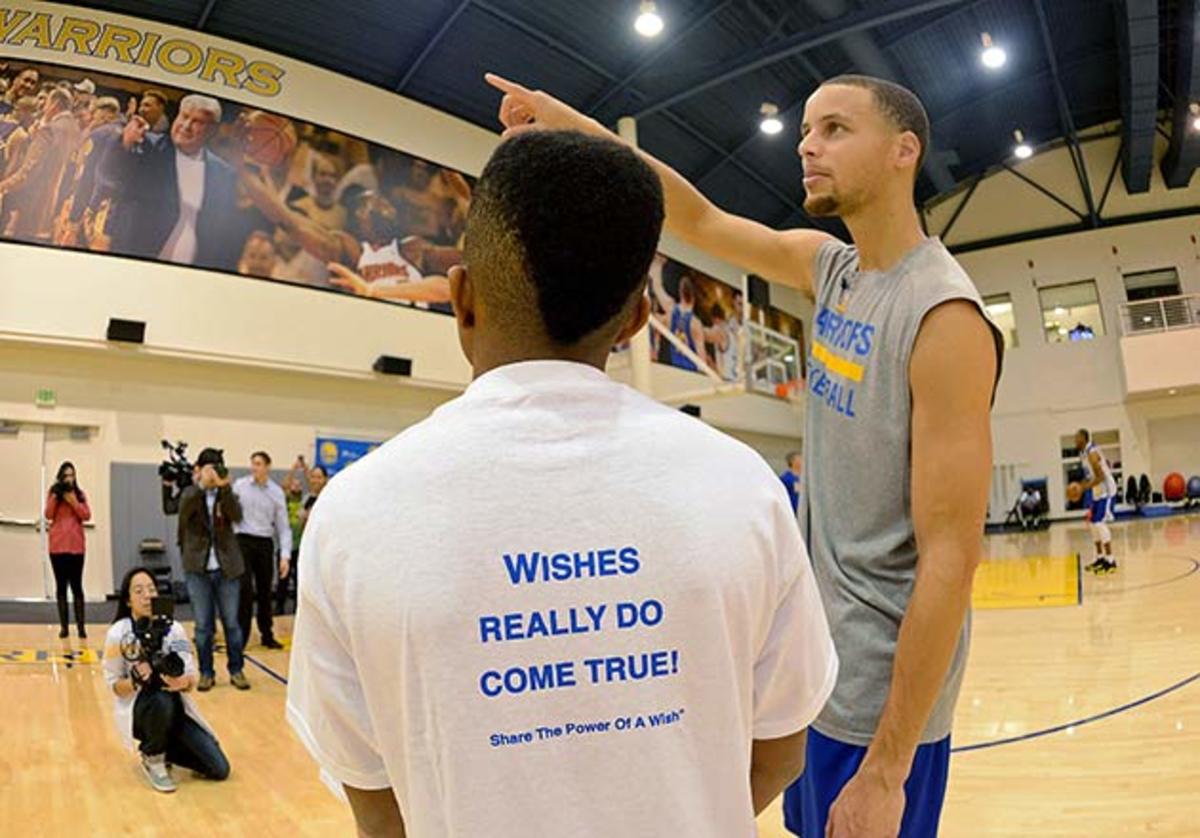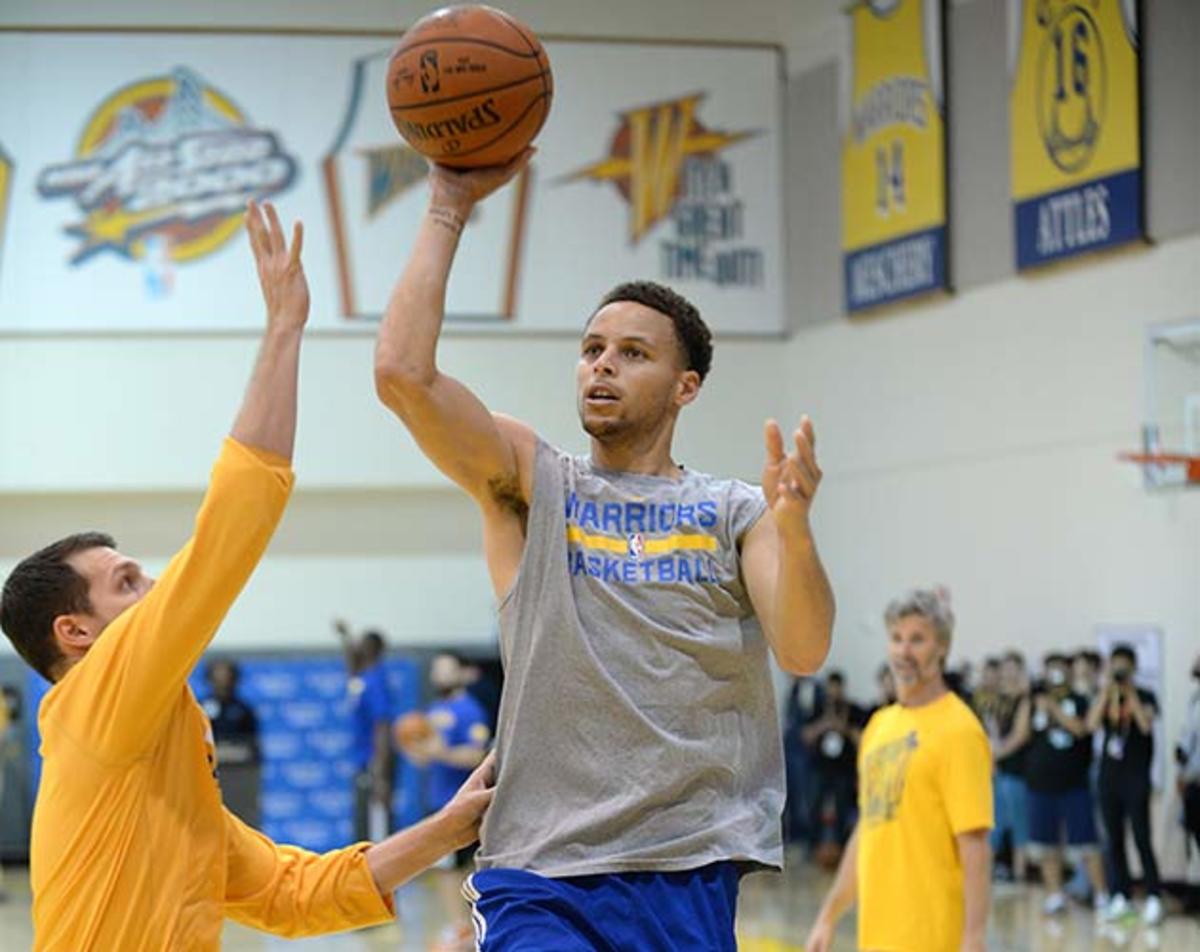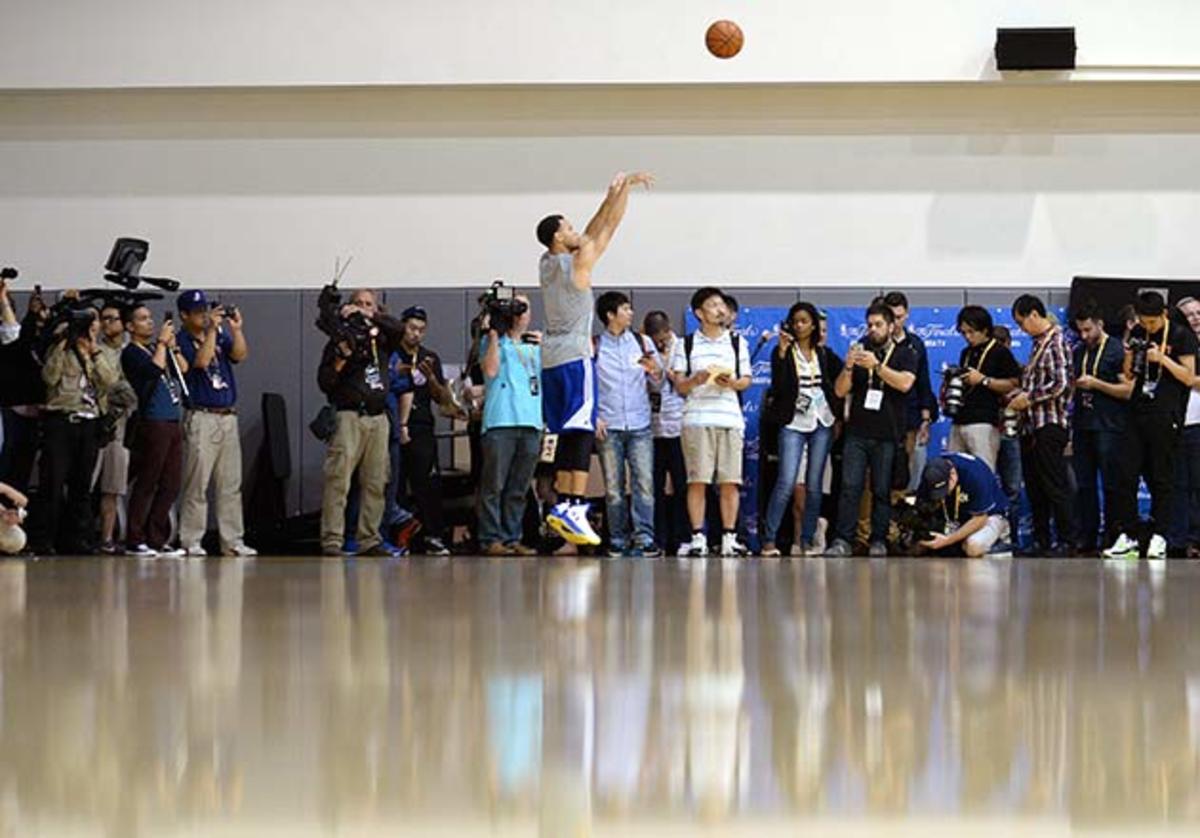Inside Warriors practices: Laughs, lessons and a little basketball

Get all of Chris Ballard's columns as soon as they’re published. Download the new Sports Illustrated app (iOS or Android) and personalize your experience by following your favorite teams and SI writers.
OAKLAND, Calif. — Earlier this season, Warriors coaches were finishing up practice when they noticed an elegant, older woman standing behind the baseline. After some discussion, they realized it was Danielle Steel, author of many books, none of which are about basketball. She’d come, along with her youngest daughter, to meet Stephen Curry. As a gift, she’d brought one of her novels.
If this seems a bit odd, well, that’s just life around the Warriors these days. Recently, Lydia Ko, the top-ranked LPGA golfer, came by the practice facility in downtown Oakland on a weekday morning. After the Warriors finished shootaround, she giddily talked with Curry before engaging in a putting contest across the gym floor. She also broke down the LPGA with Andre Iguodala, who proved knowledgeable on the topic.
These were unplanned visits, at least by the Warriors, but other guests are specifically invited. Some, like author Michael Lewis, address the team. All contribute to what is, by design, an unusual practice atmosphere, one based around a simple concept: Athletes are more productive, and happier, when they're not bored.
*****
When Steve Kerr took the Warriors coaching job in 2014, he brought files of notes with ideas on everything from analytics to personnel to conditioning to the value of yoga. Among his beliefs was that this is a players’ league, and players need to be happy. And when you spend roughly two–thirds of the year together, seven days a week, sometimes your greatest opponent is monotony. As assistant coach Bruce Fraser, Kerr’s longtime friend, puts it, “For Steve, the joy of the game is a core principle.”

So when training camp began that fall, Kerr endeavored to keep it interesting. He famously introduced music to practices—a tactic gleaned from a visit with Seattle Seahawks coach Pete Carroll. He inserted movie clips into film sessions and held impromptu competitions, including a 2-on-2 route-running game in the gym, pairing QBs and receivers.
• MORE NBA: Almost a champ: Jermaine O'Neal reflects on leaving Warriors
This season, the vibe has carried over. Here’s the team on a recent weekday morning. Outkast thunders from 14 black speakers that ring the two full courts. As the media walk in, players shoot at baskets under enormous images from the past: Rick Barry, Baron Davis face-dunking Andrei Kirilenko, Nellie in mid-command, Steph kissing the trophy (within a week, a banner reading Pacific Division Champs 2015–16 will go up). Under one basket, center Andrew Bogut talks politics with a reporter. In the far corner, assistant coach Ron Adams cranks away on a stair stepper.

Sadly, one staple of last season’s practices—Kerr versus Curry in a modified free-throw contest—has been tabled on account of Kerr’s back surgery. Instead, Curry entertains a crowd of media and onlookers with an elaborate shooting routine run by Fraser and Nick U’Ren, whose title is Special Assistant to the Head Coach and Manager Advanced Scouting but who’s really a jack–of–all–trades, involved in everything from video breakdowns to Kerr’s scheduling to team strategy.
To watch Curry, mock–wrestling with Fraser, taking crazy shots as U’Ren closes out, and, at one point, intentionally sidestepping a pass so it hits local columnist Marcus Thompson, who had momentarily stopped to check his phone, is to understand part of the Warriors’ secret sauce. “One reason our chemistry is so good is because Steph is who he is,” says Kerr. “Not to take anything away from the other guys but it’s the leader who sets the tone.” And if the leader has fun, then his teammates have fun.
U’Ren sees it every day. “A lot of NBA guys would be like, give me my 10 shots and my 10 spots, let me get out of here and go home to my family,” he says. “Don’t waste my time with this B.S. It’s probably indicative of who Steph is as a person. He’s so anti what we've come to learn about what an NBA player is, in his ability to be spontaneous, almost child-like in terms of his enjoyment. It’s pretty cool that the best player in the world is allowing small staffers to have fun.”

U’Ren may refer to himself as a “small staffer” but he’s a key figure at practices. Twenty-nine years old, soft-spoken and baby-faced—while in Phoenix with the Suns, he was named one of the city’s Most Eligible Bachelors by a local magazine, something he loves to be reminded of—U’Ren holds two important jobs: helping run Curry through shooting drills and picking the music. Last season, the latter task proved both time-consuming and anxiety-provoking. “I was always worried about if they were going to hate the song,” says U’Ren. Sometimes, one would begin blaring and Fraser would look at him and shake his head. No, no, no, not that one, leading to a hasty switch.
• MORE NBA: Golden Season: Chronicling the Warriors' pursuit of history
By now, U’Ren has built a 250–song playlist of suitable tunes, which he runs off his laptop, plugging directly into a sound system on the near side of the court. When the team goes on the road, he tries to mix in local acts: Jay-Z in New York, Motown in Detroit, local rappers in Atlanta. He does, he says, take requests.
U’Ren also assists in another Kerr tactic: guest speakers. Last year, Kerr invited two Navy Seals to speak (their message was about teamwork and preparation). Earlier this season, Kerr asked Blue Angels pilots to come in. Gathering in a far corner of the practice gym, the Warriors viewed a short video of the Angels and then Kerr led a conversation. His approach was low–key. “There are obvious parallels,” says U’Ren. “Steve brings those up but he never clubs guys over the head with them. It’s equal parts the obvious and the general human interest, like the world is bigger than basketball.”

More recently, players gathered to listen to Michael Lewis, author of “Moneyball,” “The Big Short” and “The Blind Side”. (Originally, both Lewis and Bob Melvin, the manager of the Oakland A’s, were supposed to come but Melvin couldn’t make it). Kerr primed the players, telling them about Lewis. Here was an author whose movies they’d surely seen, who’d written an in-depth story for Vanity Fair on Obama, whom the players had just met during a White House visit. Kerr acted as moderator again, asking Lewis about the process of writing a book. “He talked about how you’re really starting over every single time, no matter how experienced you are,” says U’Ren, who ended up chatting with Lewis afterward, yet another in what he calls “a series of life memories.”
• MORE NBA: Ballard: How to shoot like Stephen Curry (or at least try...)
Lewis also spoke about how a book becomes a movie—an awkward situation where people have to pretend like they care what the author thinks. But it was his discussion of his editor—“who still looks at [Lewis] like a 26-year-old kid who sucked, and is wiling to tell him when he’s not good,” as U’Ren relates—that struck a note with Curry in particular. After practice, as Lewis, wearing gray jeans and a pink button-down, lofted a couple shots, Curry spoke to reporters about Lewis’s message. "He said the more he became successful, the less people wanted to tell him that,” Curry said. “So he really cherished the couple voices he had around him that would keep it straight with him, no matter how big his name got, no matter how many awards he won, no matter how many best sellers he had. He had one editor in particular, but always a couple voices he can rely on to shoot him straight, which is great advice for anybody in our profession."
Indeed, in a season in which road games have turned into home games for the Warriors and the media crush grows by the day, perspective is a precious commodity. Staying loose and seeing the big picture become paramount. “At the most simplistic, it breaks up the day to day,” says U’Ren of the practice atmosphere, music and guests. “But they’re also these subtle reminders that I think are healthy for the players and the staff.”
U’Ren continues. “Steve rarely says this flat out, but the general tone is, the world is a big place and basketball is great. But there’s so much more to the world and life.”
